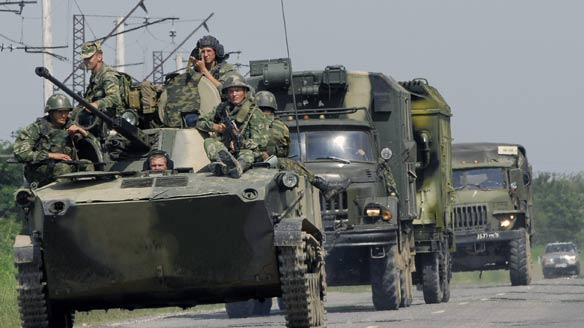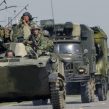
Medvedev Proposes Legal Mechanisms to Authorize Military Force Abroad
Publication: Eurasia Daily Monitor Volume: 6 Issue: 157
By:

On August 10 Russian President Dmitry Medvedev held a meeting in the Black Sea resort city of Sochi with the leaders of political parties represented in the Russian legislature, the State Duma, to discuss important issues including the current political, economic and social development in the country (www.kremlin.ru, August 10). He apprised the Duma leaders of his two latest initiatives: the first aims to make 18 the age of universal suffrage throughout Russia, a move that "would be good for strengthening Russian democracy." While the second seeks to expand the legal basis for "the use of the armed forces of the Russian Federation beyond its the borders."
In order to clarify his second initiative for Russian legislators, Medvedev stated that this legislation is closely related to "the well known developments that happened last year." He, of course, referred to the Russian invasion of Georgia and the subsequent occupation of its territories in Abkhazia and South Ossetia. "I believe these issues should be precisely regulated. Of course, we would by no means want these kinds of events to be repeated but, nevertheless, we must have a more accurate legislative basis in this regard." He once again reminded the Duma deputies of the significance of the Russo-Georgian war and its international consequences, "that we must always have in mind." However, arguably, it is not only the government in Tbilisi that should be concerned by this new Russian legislative offensive, but rather it is expected that Russia’s neighbors will also voice concerns.
The proposed amendment to the Federal Law on Defense (www.kremlin.ru, August 10) would allow Russia to use its military forces abroad in the following capacities:
1. Countering an attack on its armed forces or other military units deployed beyond its territory.
2. Countering or preventing aggression against another state.
3. Protecting the citizens of the Russian Federation abroad.
4. Fighting piracy and to ensure the safe passage of shipping.
The legislation is particularly aimed at creating a legal framework for the Russian president to "operationally" use military force overseas. The Federal Law on Defense was adopted by the State Duma and signed by then-President Boris Yeltsin in 1996, and the proposed amendment once again suggests that even under existing Russian law the use of military force and its invasion of Georgia last August was illegal. Not only did Russia violate international law, but it also did not act within the framework of existing Russian mechanisms which prohibited such use of force abroad.
There are several issues that make this new proposal particularly significant:
1. Instead of making a new law that would authorize the use of force oversees, it is an amendment to the existing Law on Defense, which means that Russia considers the use of its military abroad as a defensive measure.
2. Russia has military bases and peacekeepers in many former Soviet countries and any provocation against them could spark a Russian military response.
3. It remains unclear what the prevention of "aggression against another state" means, and this provision could potentially undermine the existing system of international security.
4. There are hundreds of thousands of Russian citizens living not only in the post-Soviet space, but also far beyond, and the readiness to use force "to protect citizens of the Russian Federation abroad" might be potentially dangerous for regional and international peace.
5. Although under the new proposal there must be a decision by the upper chamber of the State Duma prior to the use of force, "the number of formations of the armed forces of the Russian Federation, regions of their deployment, their tasks and the time framework of their use are determined by the president of the Russian Federation" – a provision that further increases the authority of the already too powerful office of president.
6. Despite the fact that the proposed amendment does make mention of "commonly recognized principles and norms of international law," which Moscow pledges to be in compliance with when using its military abroad, Russia’s permanent membership of the U.N. Security Council enables it to argue that it acted lawfully, as it already did last year during its war against Georgia or decades ago against Afghanistan, Czechoslovakia, Hungary, Finland, and the Baltic States.
The Kremlin’s new assertiveness is especially troubling for its immediate neighbors. Russian history is replete with military campaigns where ethnic and citizenship factors were adroitly used for irredentist purposes. As the deadline for the termination of the Russian naval presence in Ukraine’s Crimea approaches in 2017, there is ample evidence that Moscow has already started tampering with its lax citizenship and "compatriot" legislation in order to grant Russian passports to ethnic Russians in Crimea -as it did in Georgia’s Abkhazia and South Ossetia.
It is worth recalling that when answering a question about whether Russia would use the recognition of Abkhazia and South Ossetia as a "precedent" in relation to other countries in the post-Soviet space or whether Moscow considers these cases as "exclusive," Deputy Foreign Minister Gregory Karasin recently said that he "would rather not talk either about the precedential nature of that decision or its exclusiveness." "One thing is clear; we were not able to act in another way last August" (www.mid.ru, August 4). This statement strongly indicates that Russia no longer acknowledges the post-Soviet borders either as legitimate or acceptable, and might violate other neighbors’ territorial integrity if circumstances would dictate the expediency of such moves.




